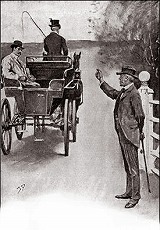And that was a most vague direction. I realized it as I drove back and noted how hill after hill showed traces of the ancient people. Barrymore’s only indication had been that the stranger lived in one of these abandoned huts, and many hundreds of them are scattered throughout the length and breadth of the moor. But I had my own experience for a guide since it had shown me the man himself standing upon the summit of the Black Tor. That, then, should be the centre of my search. From there I should explore every hut upon the moor until I lighted upon the right one. If this man were inside it I should find out from his own lips, at the point of my revolver if necessary, who he was and why he had dogged us so long. He might slip away from us in the crowd of Regent Street, but it would puzzle him to do so upon the lonely moor. On the other hand, if I should find the hut and its tenant should not be within it I must remain there, however long the vigil, until he returned. Holmes had missed him in London. It would indeed be a triumph for me if I could run him to earth where my master had failed.
Luck had been against us again and again in this inquiry, but now at last it came to my aid. And the messenger of good fortune was none other than Mr. Frankland, who was standing, gray-whiskered and red-faced, outside the gate of his garden, which opened on to the highroad along which I travelled.

“Good-day, Dr. Watson,” cried he with unwonted good humour, “you must really give your horses a rest and come in to have a glass of wine and to congratulate me.”
My feelings towards him were very far from being friendly after what I had heard of his treatment of his daughter, but I was anxious to send Perkins and the wagonette home, and the opportunity was a good one. I alighted and sent a message to Sir Henry that I should walk over in time for dinner. Then I followed Frankland into his dining-room.
“It is a great day for me, sir - one of the red-letter days of my life,” he cried with many chuckles. “I have brought off a double event. I mean to teach them in these parts that law is law, and that there is a man here who does not fear to invoke it. I have established a right of way through the centre of old Middleton’s park, slap across it, sir, within a hundred yards of his own front door. What do you think of that? We’ll teach these magnates that they cannot ride roughshod over the rights of the commoners, confound them! And I’ve closed the wood where the Fernworthy folk used to picnic. These infernal people seem to think that there are no rights of property, and that they can swarm where they like with their papers and their bottles. Both cases decided, Dr. Watson, and both in my favour. I haven’t had such a day since I had Sir John Morland for trespass because he shot in his own warren.”
“How on earth did you do that?”
“Look it up in the books, sir. It will repay reading - Frankland v. Morland, Court of Queen’s Bench. It cost me £200, but I got my verdict.”
“Did it do you any good?”
“None, sir, none. I am proud to say that I had no interest in the matter. I act entirely from a sense of public duty. I have no doubt, for example, that the Fernworthy people will burn me in effigy to-night. I told the police last time they did it that they should stop these disgraceful exhibitions. The County Constabulary is in a scandalous state, sir, and it has not afforded me the protection to which I am entitled. The case of Frankland v. Regina will bring the matter before the attention of the public. I told them that they would have occasion to regret their treatment of me, and already my words have come true.”
“How so?” I asked.
The old man put on a very knowing expression.